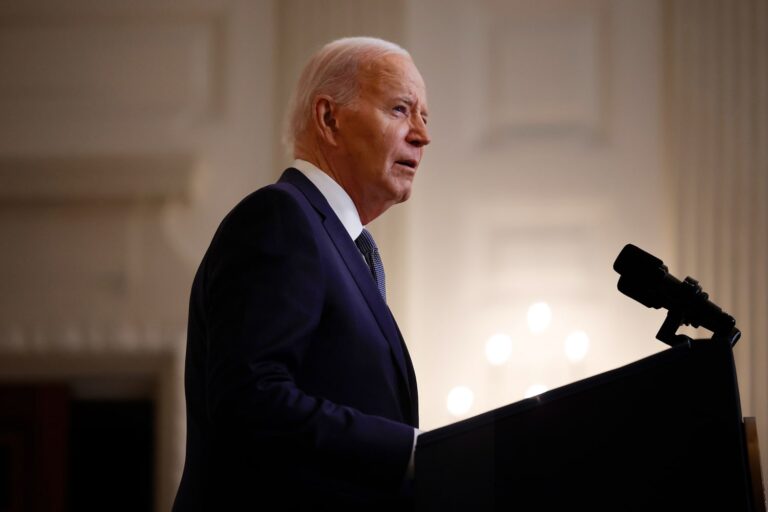JERUSALEM — President Joe Biden’s description of an Israeli ceasefire proposal is “not accurate,” a senior Israeli official told NBC News, raising doubts Monday about the U.S. ally’s stance on the ceasefire agreement.
In a surprise announcement on Friday, Biden said he would outline a ceasefire proposal that had been drawn up by Israel and passed to Hamas through an intermediary.
But Israeli Prime Minister Benjamin Netanyahu faces conflicting pressure from Washington and hostage families on the one hand and threats to topple his government from right-wing ministers on the other, and senior Israeli officials have questioned Biden’s explanation for the ceasefire proposal.
The official specifically took issue with Israel agreeing to a complete withdrawal of its troops from the Gaza Strip as part of the deal to release the hostages.
“Israel has not changed its conditions for reaching a permanent ceasefire, which will come only after our objectives are achieved, including destroying Hamas’ military and governing capabilities,” the official said.
The official also said that while the White House said the plan originated in Israel, it was in fact a proposal proposed by an intermediary with modifications and changes made by Israel.
“It’s strange to say it’s an Israeli proposal and at the same time say Israel should agree to it,” the official said, adding that Israel was waiting for Hamas’ formal response to the proposal.
U.S. officials pushed back on Monday, telling NBC News that Biden outlined the Israeli proposal but was also aware that Netanyahu would face pressure from far-right officials and urged the Israeli government not to back down from it.
Biden said Friday that the proposal had been sent to the militant group via Qatar, which has been mediating the talks for months.
A Hamas spokesman said the organization “positively views” the contents of Biden’s speech. Egyptian Foreign Minister Sameh Shoukry reaffirmed on Monday that Hamas views the proposal positively and said all parties were awaiting Israel’s response.
Biden said Israel had presented a “comprehensive new proposal” that could ultimately lead to a permanent ceasefire in Gaza.
Biden said the three-part plan includes the withdrawal of Israeli troops from all populated areas of the Gaza Strip and the release of scores of hostages who have been held inside the Strip since a Hamas-led offensive on Oct. 7. The first phase of the plan will also see the implementation of a six-week complete ceasefire.
“We can’t count the hostages until they come home.”
Biden’s speech has put Netanyahu under new pressure both at home and abroad.
Two of Netanyahu’s right-wing ministers have threatened to quit the coalition that has kept him in power if he agrees to Biden’s proposed ceasefire deal. Israeli media reported on Monday that Netanyahu was planning to meet with hardline National Security Minister Itamar Ben Gvir over the threats to quit.
At the same time, families of Israeli hostages are stepping up their demands for the government to reach an agreement to ensure the release of their loved ones.
Rachel Goldberg Pollin, whose son, Hirsch, has been held in Gaza since Oct. 7, said Monday that she was hopeful about Biden’s proposal but remained cautious.
“The countdown is over until the hostages go home and embrace each other,” she told NBC News in an interview in Jerusalem, adding, “I’d like to think this is the beginning of the end.”
Goldberg-Polin criticized Israeli officials for saying continuing the war was more important than bringing the remaining hostages home. “If you believe it’s just to continue this, then stop the war for five hours, let 125 people get out, and then continue the war with your people who are there with their sons, daughters, mothers, brothers, sisters, grandfathers, babies,” she said. “Our people have been serving nine months in hell.”
The Biden administration also continued its pressure campaign over the weekend.
Secretary of State Antony Blinken spoke late Sunday with Israeli Defense Minister Yoav Gallant and his war minister Benny Gantz, and “commend[ed]” the Israeli proposal and told both sides that it was now up to Hamas to accept it, according to a summary of the call released by the State Department.
The ceasefire agreement would provide a much-needed reprieve for Palestinians in the Gaza Strip, where Israel’s Rafah military operation has forced more than one million people to flee the southern city, the U.N.’s Relief and Works Agency for Palestine Refugees in the Near East (UNRWA) said on Monday.
The IDF said it had advanced deeper into Rafah despite U.S. warnings and was continuing “intelligence-based, targeted operations.”
Despite Biden calling it an Israeli proposal, Netanyahu has yet to publicly respond and the country’s official position was not immediately clear. NBC News reached out to the Israeli Prime Minister’s Office for clarification.
His office issued a statement on Saturday saying Israel’s conditions for ending the war had not changed and that a permanent ceasefire was “not feasible” until the conditions were met.
But in an interview with Britain’s Sunday Times newspaper, Ophir Falk, Netanyahu’s chief foreign policy adviser, said Israel was not rejecting the agreement. “The agreement is what we agreed to, and it’s not a good agreement, but we sincerely want the hostages to be released,” Falk said.
Rafe Sanchez reported from Jerusalem, Julia Talmazan from London and Monica Alba from Washington.

